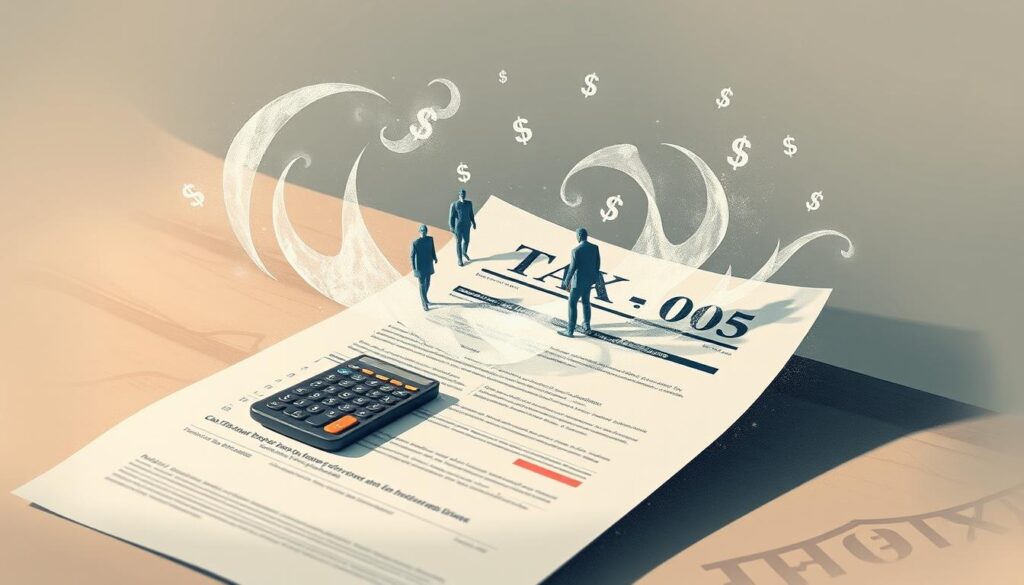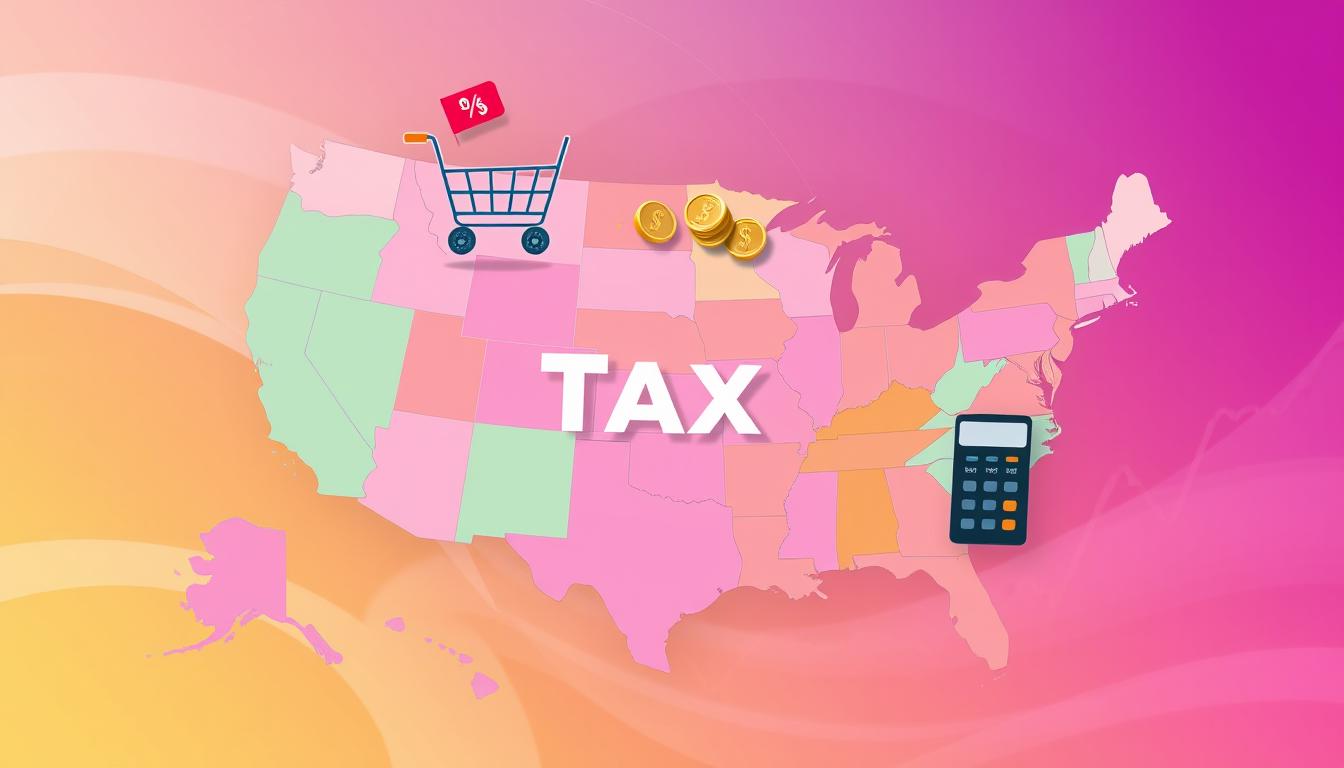Did you know almost 60% of small businesses face money problems because of unexpected taxes? This is often due to something called phantom tax. It’s a tax on money you haven’t actually got in cash1. For those dealing with complex money matters, like investments and owning a business, phantom tax is a big deal. It can surprise you with financial stress. This article will explain phantom tax in detail. We’ll show you how it affects your money. And we’ll give you tips on how to handle it.
Key Takeaways
- Phantom tax refers to taxation on income that isn’t actually received in cash.
- It often arises from investment gains, partnership distributions, and specific retirement plans.
- Understanding phantom income is essential for proper financial planning and avoiding unexpected liabilities.
- The IRS focuses closely on income reporting, complicating tax scenarios involving phantom tax.
- Implementing effective tax strategies can mitigate the impact of phantom tax on personal and business finances.
What Does Phantom Tax Mean?
Phantom tax is also called phantom income or dry income. It’s the tax on money you haven’t gotten. This happens when you need to pay taxes on income you didn’t actually get. Knowing what phantom tax means is key for smart money management.
Definition of Phantom Tax
The term definition of phantom tax refers to taxes on money or gains that aren’t in cash. For example, if your stocks go up in value, you might owe taxes, even if you haven’t sold them for cash2. Property owners might also deal with phantom taxes through depreciation claims2. And if you own bonds that don’t pay until later, you still owe taxes on the interest each year3.
Common Contexts for Phantom Tax
Phantom tax shows up in many financial situations. In a partnership, you might pay taxes on your profit share without getting any money3. This is classic phantom income. Also, if your debt is forgiven, that cancelled debt counts as taxable income3.
Phantom tax plays a big role in real estate and non-cash work benefits4. Selling real estate can bring up taxes on deductions you previously claimed. Things like company perks count as phantom income too3.
How Phantom Tax Occurs
Getting a grip on how phantom tax works is key for smart money management. This type of tax can pop up in different situations, affecting both individuals and companies. Let’s look at some typical cases where phantom tax might worry you.
Investment Gains in Tax-Deferred Accounts
Phantom taxes often show up in places like IRAs or 401(k)s. Here, you might see your investments grow without owing taxes right away. However, when you start taking money out, the increase in value of these investments could mean you owe taxes on money you haven’t actually received yet, leading to surprise bills5. It’s important to know that these unrealized profits are still seen as income you need to pay taxes on6.
Partnership Income and LLC Distributions
In partnerships and S corporations, phantom income is a common issue. You could be taxed on the business’s income even if you haven’t gotten any money yourself7. This can make your tax situation tricky, as you might owe taxes on earnings that haven’t hit your bank account. LLC owners face a similar squeeze if they have to pay taxes on profits they choose to keep in the business7.
Real Estate Scenarios
Real estate is a prime example of where phantom tax can hit. Selling a property might leave you with a tax tab that’s way more than the cash you pocket, thanks to things like depreciation7. So, even if you don’t feel richer from the sale, you might still have to pay taxes as if you did5.
Deferred Compensation Situations
Deferred compensation plans can also lead to phantom income, meaning you’re taxed before you see any cash. For example, getting stock options for your hard work could trigger taxes even though you can’t cash them in right away6. Being smart about taxes ahead of time is crucial here, so you’re prepared for these hidden tax hits5.

Why Phantom Tax Happens
Understanding phantom tax is crucial for those navigating their taxes8. The IRS focuses on how income and gains are taxed, even without cash exchanges. This leads to paying taxes on unearned income. Simply put, phantom tax means you’re taxed on income you didn’t get.
IRS Focus on Income and Gains
The IRS looks closely at income from different sources, causing phantom income issues9. For example, in a partnership or an S Corporation, taxes are owed on the company’s net income, whether or not you’ve received any money. If you own 10% of a business, you’re taxed on your share of profits, like $5,000 out of $50,000, without any cash distribution9. This connects IRS focus to the challenges of business setups.
Complicated Tax Laws
The complexity of tax laws leads to phantom tax problems. Many find it hard to know their tax dues because of unrealized investment gains9. Even without cash gains, you might owe taxes on paper profits8. Thus, navigating tax laws often requires help and constant vigilance.
Examples of Taxable Phantom Income
Several real-life cases show how phantom taxes work. For instance, zero-coupon bonds are taxed yearly on interest that hasn’t been paid yet8. Mutual funds might distribute capital gains as taxable income, even if the fund’s value drops. And Real Estate Investment Trusts (REITs) may give out non-cash earnings as taxable income8. These situations show the various ways phantom income affects financial plans.

Impact of Phantom Tax on Your Finances
Phantom tax can really shake up your finances. It makes managing taxes, cash flow, and investment returns tricky. Knowing how it affects you is key to staying financially sound.
Increased Tax Liability
Phantom gains mean you owe more taxes. This happens when you have gains that you haven’t sold yet. You end up owing taxes without having cash on hand10. This can put you in a tough spot, facing big tax bills without the money to cover them11.
Cash Flow Consequences
Phantom tax can mess with your cash flow. You might pay taxes on adjustments, like with TIPS, without making any real sales12. This can lead to budget problems and tight finances. It shows why planning ahead is crucial.
Implications for Investment Returns
Phantom income can mislead you about your investment gains. Knowing that these gains aren’t what they seem is important. They can cause wrong tax estimates and fines for mistakes10. Using smart strategies, like boosting your retirement savings and matching gains with deductions, can help you deal with these tax issues. This ensures you get the most from your investments10.

Strategies to Manage Phantom Taxes
To handle phantom taxes, you need a well-thought-out plan that focuses on early and active financial planning. Using smart tax strategies, you can reduce the surprise of unexpected taxes. This approach can lessen the impact of taxes you didn’t see coming.
Tax Planning and Projections
Planning your finances well is key to avoiding problems with phantom income. Professionals, especially in partnerships, might deal with income allocations that don’t match what they actually get. This gap can cause tax surprises due to the rules in the partnership agreement13 and14. By predicting these taxes ahead of time, you can set aside the right amount of money to handle them when tax season arrives.
Distributing Profits Wisely
Smartly sharing out profits can lower the chances of facing phantom income. For example, if partners decide not to take out all their income from the business, phantom income might pop up. It’s important to understand how distributions work and take out money at the right time to avoid unexpected taxes13. Clear communication with partners about profit sharing can ensure everyone’s on the same financial page.
Setting Up Reserve Funds
Creating reserve funds is like building a safety net for tax obligations. Putting some profits into reserves means you’ll have funds ready for any tax bills from phantom income or other surprises. Regular checks on your finances and smart cash flow management can make it easier to handle these taxes. Firms that use cash basis accounting find that having a cash reserve is a good strategy14.

Conclusion
It’s essential to understand phantom tax for anyone in investing, business, or financial planning. This overview shows that phantom tax can surprise people. They need to pay taxes on money they have not received yet. Around 10% of income from partnerships and S-corporations is considered phantom income. Knowing its financial effect on your money is crucial15.
To handle phantom tax complexity, plan well, distribute profits wisely, and keep enough money on hand. Experts can also offer you specific financial advice. This can help you deal with unexpected tax bills. The way phantom income is taxed is a hot topic. It needs careful attention from everyone who pays taxes1617.
Being informed and active about phantom tax challenges makes you financially smarter. If you know about the risk of not having cash due to phantom income and act on it, you can protect your money. This way, you aim for a secure financial future.
FAQ
What is phantom tax?
How does phantom income arise in tax-deferred accounts?
Why should I be concerned about phantom tax?
What are some strategies to manage phantom taxes effectively?
How can I prepare for potential phantom tax liabilities?
Are there specific examples of phantom income?
How does the IRS handle phantom income?
Source Links
- Phantom Tax Explained: Impacts & Strategies | InvoiceOwl – https://www.invoiceowl.com/blog/phantom-tax/
- What Does Phantom Tax Mean? – IncommTax – https://incommtax.com/what-does-phantom-tax-mean/
- Phantom Income: What It Is and How It’s Taxed – https://www.investopedia.com/terms/p/phantom-income.asp
- What is Phantom Tax? Understanding the Concept – https://syedpro.us/phantom-tax/
- What Does Phantom Tax Mean & How it Works? (2024) – https://accountingbyte.com/what-does-phantom-tax-mean/
- What is Phantom Tax? Understanding Phantom Income and Tax – Federal Tax Resolution – https://federaltaxresolution.com/what-is-phantom-tax-understanding-phantom-income-and-tax/
- Phantom Income: Definition & Risks – https://www.freshbooks.com/glossary/tax/phantom-income?srsltid=AfmBOophYkxxQtbHE6cB2UsX9mavVqwuWelUMOWUDPawCd315s-MKnRk
- What Is the Phantom Tax? – https://www.aol.com/phantom-tax-181837405.html
- Phantom Income: Definition & Risks – https://www.freshbooks.com/glossary/tax/phantom-income?srsltid=AfmBOopmVIzbZoAKSPzW6w1_DtkW93p7Acefl-oBIIux7Q4pu3U2xyfJ
- Phantom Income: What It Means, How It Works – https://www.acquire.fi/glossary/phantom-income-what-it-means-how-it-works
- Phantom Gains Unmasked – https://www.capstonetax.com/phantom-gains-stocks
- Will holding TIPS in my brokerage account ruin my year with ‘phantom tax’? – https://www.morningstar.com/news/marketwatch/2024122851/will-holding-tips-in-my-brokerage-account-ruin-my-year-with-phantom-tax
- An Overview of Phantom Income in a Professional Services Firm – Smith and Howard – https://www.smith-howard.com/an-overview-of-phantom-income-in-a-professional-services-firm/
- Phantom Income: Definition & Risks – https://www.freshbooks.com/glossary/tax/phantom-income?srsltid=AfmBOorav0cnLdbD1z3EKdiT6cISlPM0ggh0aa5gadFkiOTbWqlMm8k9
- What Is Phantom Tax: A Guide to Hidden Tax Liability – https://financemmc.com/what-is-phantom-tax/
- Microsoft Word – Hayashi – Taxing Phantom Income – https://ntanet.org/wp-content/uploads/proceedings/2014/005-hayashi-taxing-phantom-income-simple-economics.pdf
- Phantom Regulations Under The APA | Tax Notes – https://www.taxnotes.com/procedurally-taxing/phantom-regulations-under-the-apa









